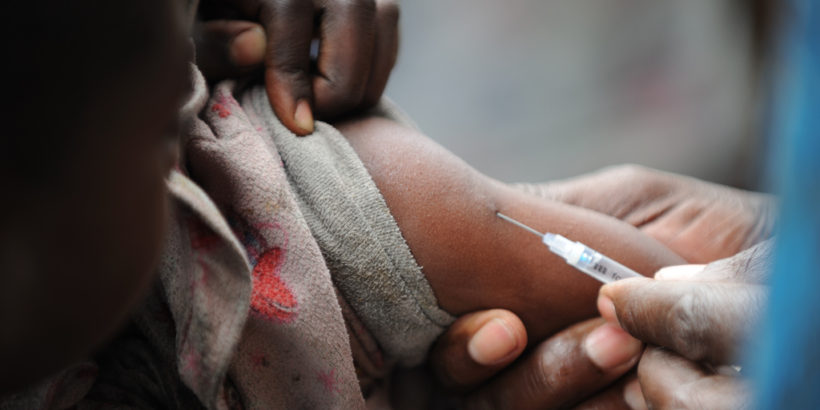Typhoid is a disease that strikes the most vulnerable, and refugees are no exception. This autumn, flooding and rains have ushered in outbreaks of typhoid and other diseases in two refugee camps in South Sudan and North Darfur.
The South Sudanese Yousef Batil camp is one of the largest refugee camps in the Upper Nile region of South Sudan, housing about 37,000 men, women and children. These refugees, who fled armed conflict in the state of Blue Nile in Sudan, have been living in this camp since 2012. Over the past few weeks, torrential rains have caused flooding and further deteriorated the living conditions in Yousef Batil camp. In the wake of these floods, diseases such as malaria, pulmonary infections and typhoid are spreading rapidly.
Typhoid, a dangerous disease that can cause fever, lack of appetite, vomiting and diarrhea, is transmitted through contaminated food and water. Risk of transmission is particularly pronounced during rains and floods, when the weather damages infrastructure and contaminated water seeps into clean water supplies. The crowded camp, described as “a mud bath,” presents ideal conditions for typhoid to spread.
To make matters worse, the monthly food rations have been reduced by 35 percent. Many children already at risk of contracting typhoid are now acutely malnourished, thereby weakening their immune systems and leaving them less able to fend off disease. Refugees’ fear of typhoid is also leading to negative consequences. Adults are keeping children inside to avoid the pools of contaminated water. With so many children unable to leave their homes, kindergartens in the refugee camp have been closed for lack of attendance. Refugee advocates fear these children will lose educational opportunities due to displacement and camp conditions, creating a “lost generation” of refugees. As in any vulnerable population, an added disruption like typhoid can create lasting negative consequences.
The Sortony camp in North Darfur, Sudan, faces a similar situation. The camp, which houses nearly 70,000 refugees, has seen several outbreaks since July from waterborne diseases including typhoid. Coordinators are calling for urgent medical intervention, warning that a major humanitarian disaster is imminent if authorities do not remedy the situation. In a situation like this one and the one at the Yousef Batil camp, where infrastructure is deteriorating, outbreaks have the potential to grow deadly.
Without antibiotic treatment, typhoid kills 10-20 percent of those infected. Severe side effects can include intestinal perforation, hemorrhage and coma. Although typhoid is easily treated by antibiotics, multi-drug resistant typhoid is on the rise, particularly in sub-Saharan Africa. Without effective antibiotics, treating typhoid becomes expensive, difficult and complicated.
A record 65.3 million people were displaced from their homes by violence in the past year. Many of those refugees live in camps like Yousef Batil and Sortony. South Sudan alone houses 259,796 refugees, while Sudan houses over 362,000. With refugee camps strained to capacity, treating typhoid – especially multi-drug resistant strains – presents a considerable public health challenge.
Much of this burden can be avoided through preemptive vaccination initiatives. In the past, targeted vaccination in refugee camps have proven effective in stopping outbreaks. In 2014, health workers were able to stop an outbreak of meningitis in a refugee camp in Chad by quickly organizing educational messages and a coordinated vaccination campaign. In 2015, more than 100,000 refugees in Tanzania were vaccinated against cholera after the disease killed 31 people in a month, thereby preventing countless more cholera cases from threatening refugee communities.
Effective vaccines for typhoid exist. In places like the Yousef Batil and Sortony camps, where dense populations, crumbling infrastructure, little access to clean water and chronic shortages of food and medicine put the population at risk, these vaccines represent a solution to the threat of disease. All vulnerable communities should have vaccine protection against typhoid – especially communities as vulnerable as refugee camps.



